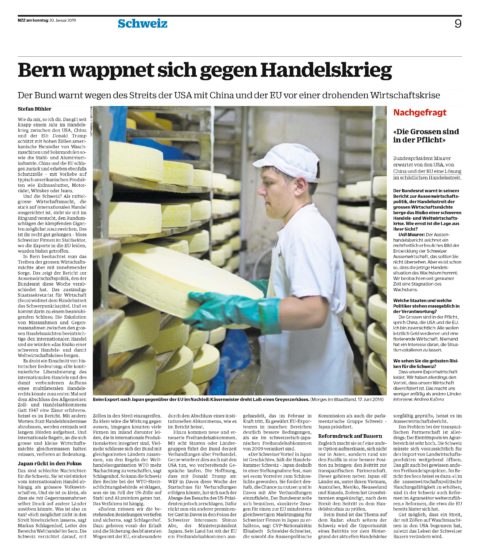NZZaS: Bern Is Preparing for a Trade War – Japan is gaining in importance

The Swiss Federation has issued a warning that the United States’ quarrel with China and the EU could result in an economic crisis.
By Stefan Bühler
NZZ on Sunday, 20 January 2019, p. 9 [Translation by SJCC]
Bern Is Preparing for a Trade War
“Tit for tat” appears to be the approach in the trade war between the US, China, and the EU which has been raging for almost a year: Donald Trump uses high tariffs to protect American washing machine and solar system manufacturers as well as the U.S. steel and aluminum industries. China and the EU are striking back by raising protective tariffs, preferably for typically American products such as peanut butter, motorcycles, whiskey, and jeans.
And Switzerland? As a medium-sized economic power heavily reliant on international trade, the Swiss are affected, but they are trying hard to stay out of the crossfire of the combatants. Their efforts have been reasonably successful; so far, only the Swiss steel sector has been hit, which has affected Swiss exporters to the EU.
In Bern, however, the goings-on of the three economic powers give rise to increasing concern, as can be seen in the report on foreign economic policy which the Swiss Federal Council issued this week. The State Secretariat for Economic Affairs (SECO) has devoted a main focus section to the trade dispute – and has come to a disturbing conclusion: The escalation of measures and countermeasures between the major trading powers is affecting international trade and poses the risk of a serious trade crisis which could spread to affect the global economy.
There is a risk of a historic downturn. According to the report, the continued liberalization of international trade and the associated establishment of multilateral trade legislation could be a turning point for the first time since the conclusion of the General Agreement on Tariffs and Trade (GATT) of 1947. In other words: Instead of reducing trade barriers, hurdles are being set up for the first time in a long while. Moreover, international rules, which large and small economic powers must follow equally, are losing their importance.
Japan is gaining in importance
This situation is bad news for Switzerland, which depends on international trade to a greater extent than larger economies. Moreover, the country is too small to issue countermeasures to put pressure on other countries. What can be done? “If possible, do not get involved in the dispute,” says Markus Schlagenhof, Head of Global Trade at SECO. Switzerland has refrained from intervening in the dispute by raising customs duties. The impact on the outside would be too small, but many domestic companies tied to international production chains could suffer. Instead, the federal government is joining forces with like-minded countries to give more consideration to the rules of the World Trade Organization (WTO), says Schlagenhof. For example, Switzerland could sue the WTO Dispute Settlement Body, which it did in the case of U.S. tariffs on steel and aluminum. Legal proceedings are pending.
“Also, we must strengthen and secure existing relationships,” according to Schlagenhof. This includes, first and foremost, maintaining and safeguarding the bilateral path with the EU, in particular through the signing of an institutional agreement as stated in the report.
There are also new and renewed free trade agreements. The federal government is currently negotiating free trade agreements with eight states or groups of countries. It would also like to do this with the US, where preparatory talks are underway. However, the hope that Donald Trump will be able to start negotiations at the WEF in Davos this week was dashed after the cancellation of the U.S. President’s visit. Instead, another prominent guest to Davos has been in the news in Switzerland: Shinzo Abe, the Prime Minister of Japan. His country has negotiated a free trade agreement with the EU which comes into force in February. It provides EU exporters with significantly better conditions in some areas than those enshrined in the 2009 Swiss-Japanese Free Trade Agreement.
In an official statement, the Swiss Japanese Chamber of Commerce has announced that the Swiss advantage in Japan is a thing of the past and that Switzerland has lost its precursor role. It therefore recommends taking advantage of the WEF to negotiate with Abe in Davos. The Federal Council should endeavor to obtain “a firm commitment of market access for Swiss firms in Japan that is at least equivalent to that of EU countries,” according to CVP National Councilor Elisabeth Schneider-Schneiter, who presides over both the Foreign Policy Commission and the Parliamentary Group Switzerland – Japan.
Reform Pressure on Swiss Farmers
At the same time, Schneider-Schneiter points to another opportunity for Switzerland to position itself better, not just in Asia but all over the Pacific region: by joining the Trans-Pacific Partnership. In addition to Japan, this body comprises eleven countries, including Vietnam, Australia, Mexico, New Zealand, and Canada. The UK has also announced that it considers joining the trade alliance after Brexit.
For Switzerland, the topic is high priority. According to the Foreign Economic Report, the possibility of joining is being scrutinized against the background of the current trade crisis.
One problem of the Trans-Pacific Partnership is, however, is a high entrance fee with regard to the agricultural sector. Switzerland might have to open up considerably for the import of agricultural products. This also applies to certain other free trade projects. According to SECO, to increase Switzerland’s ability to act in foreign economic policy, reforms in the agricultural sector are unavoidable. These are reforms that the EU has already implemented.
A dispute that started with tariffs on washing machines in the US may, therefore, end up having a fundamental impact on the lives of Swiss farmers.

 Full article, NZZ am Sonntag, 20.01.2019 (pdf)
Full article, NZZ am Sonntag, 20.01.2019 (pdf)